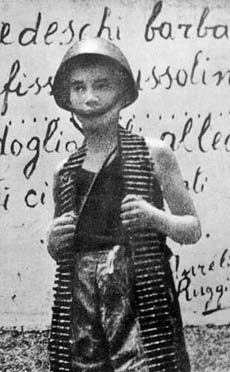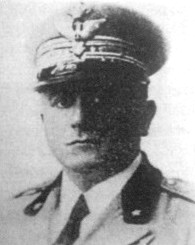
Pietro Badoglio, 1st Duke of Addis Abeba, 1st Marquess of Sabotino, was an Italian general during both World Wars and the first viceroy of Italian East Africa. With the fall of the Fascist regime in Italy, he became Prime Minister of Italy.

Victory Day is a public holiday celebrated in Malta on 8 September and recalls the end of three historical sieges made on the Maltese archipelago, namely: the Great Siege of Malta by the Ottoman Empire ending in 1565; the Siege of Valletta by the French Blockade ending in 1800; and, the Siege of Malta during the Second World War by the Axis forces ending in 1943.

The Armistice of Cassibile was an armistice that was signed on 3 September 1943 between Italy and the US and UK during World War II. It was made public five days later.
Gianni Baget Bozzo was an Italian Catholic priest and politician.

The Italian Civil War was a civil war in the Kingdom of Italy fought during the Italian campaign of World War II between Italian fascists and Italian partisans and, to a lesser extent, the Italian Co-belligerent Army.

Italian irredentism in Corsica was a cultural and historical movement promoted by Italians and by people from Corsica who identified themselves as part of Italy rather than France, and promoted the Italian annexation of the island.

The Four Days of Naples was an uprising in Naples, Italy, against Nazi German occupation forces from September 27 to September 30, 1943, immediately prior to the arrival of Allied forces in Naples on October 1 during World War II.

Operation Achse, originally called Operation Alaric, was the codename for the German operation to forcibly disarm the Italian armed forces after Italy's armistice with the Allies on 3 September 1943.

Polizeiregiment "Südtirol", later Bozen, and finally SS-Polizeiregiment "Bozen", was a military unit of the German Ordnungspolizei recruited in the largely ethnic-German Alto Adige region in north-east Italy in late 1943, during the de facto German annexation of the region. The ranks were ethnically German Italian draftees while officers and NCOs were Germans.

Filippo Illuminato was an Italian partisan who died attacking Nazi German troops during the Four days of Naples in World War II. He was posthumously awarded the Gold Medal of Military Valour, Italy's highest award for gallantry.
The Italian partisan brigades were armed formations involved in the Italian resistance during the World War II.

Oreste Del Buono was an Italian author, journalist, translator, literary critic and screenwriter.

Uguccione Ranieri Bourbon del Monte di Sorbello, better known as Uguccione Ranieri di Sorbello, or simply Uguccione Ranieri, was an Italian scholar, journalist and writer; he was also a war hero and a Public Administration official and director at the Ministry of Popular Culture, Tourism and Entertainment based at the Ministry of Foreign Affairs. He was a member of the noble Ranieri Bourbon di Sorbello family, with the title of marquis of Sorbello and count of Civitella.

Pietro d'Acquarone, I Duke d'Acquarone (born Pietro Acquarone; was an Italian aristocrat, Brigade General, entrepreneur and politician. He was nominated to the Senate of the Kingdom of Italy in 1934. Close to the royal family, in 1939 he was appointed Minister to the Royal Household. He was a trusted advisor to the King during the difficult later years of the Mussolini régime, and played a central role in the final meeting of the Grand Council that took place overnight on 24/25 July 1943, and in the frantic consultations that ensued. He accompanied Victor Emmanuel III to Pescara and Brindisi on 9/10 September 1943 and then stayed with the King until the latter's abdication 32 months later.

Antonio Sorice was an Italian general during World War II, Undersecretary for War from February to July 1943 and Minister of War from July 1943 to February 1944.

Giorgio Carlo Calvi, Count of Bergolo was an Italian general during World War II and the husband of Princess Yolanda of Savoy, the eldest daughter of King Victor Emmanuel III.
Ettore Deltetto, also known as Ettore Del Tetto was an Italian general during World War II.

Riccardo Pentimalli was an Italian general during World War II.

Vittorio Sogno was an Italian general during World War II.

Luigi Marchesi was an officer in the Royal Italian Army during World War II, most notable for his involvement in the events surrounding the Armistice of Cassibile.

















